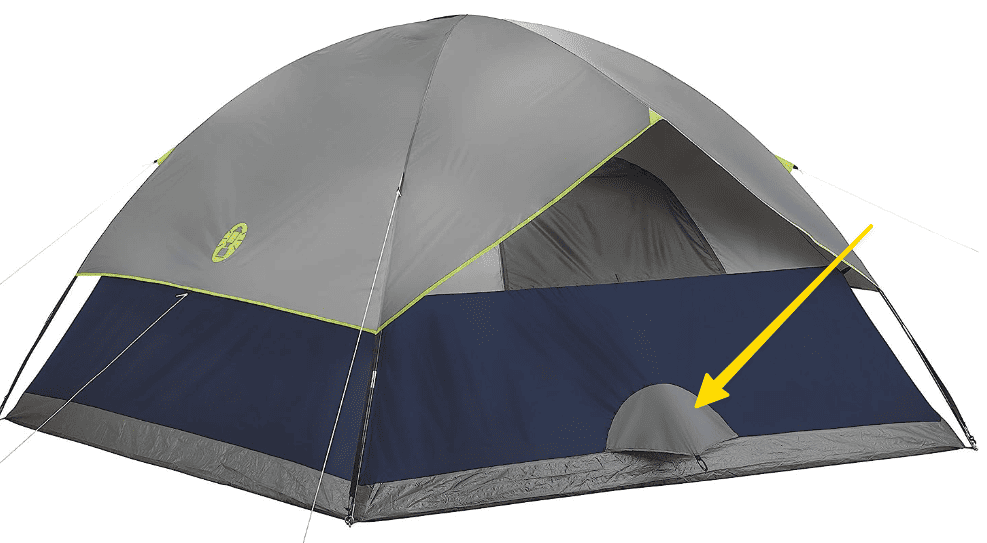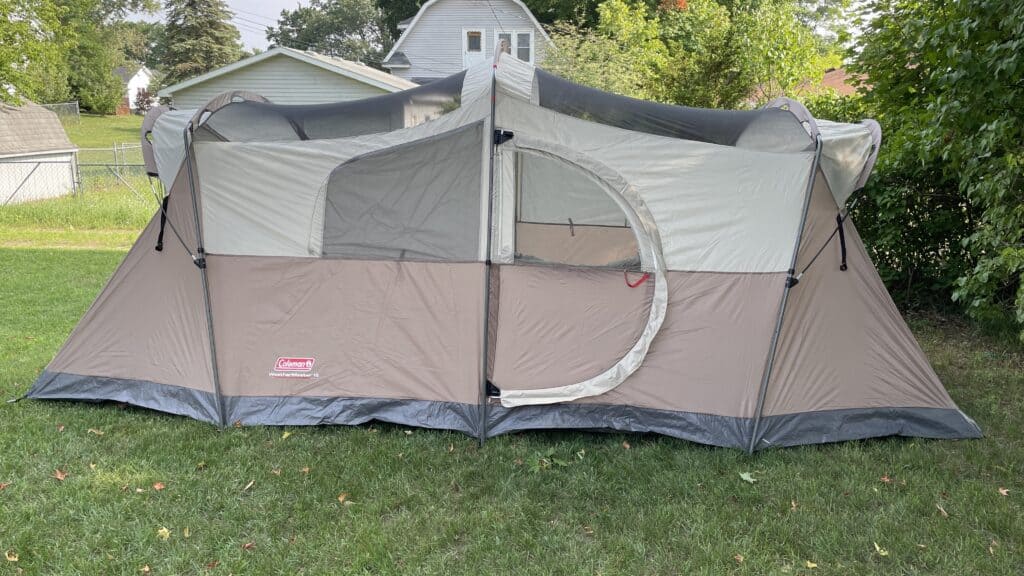SUMMARY: The best tent for humid weather combines excellent ventilation with durable, water-resistant materials. Consider factors such as mesh paneling and looser-fitting rainfly attachments (that breathe more). We like the Coleman Weathermaster, as well as the side-venting Coleman dome tents.
Ever been on a camping trip when your tent turned into a mini sauna? 👀🏕️
Yeah, me too, and trust me, it’s about as fun as getting a s’more stuck in your hair. 😂
Here’s a sneak peek of what you’ll uncover in this reading adventure:
- The life-saving, eyebrow-raising importance of weatherproofing your tent 🌧️🛡️
- The must-have features that no one talks about for a tent able to battle the humidity 💪🔎
- Top-notch tents that have taken the weather beating and come out victorious 🥊 🏆
- Insider secrets to breathe life and longevity into your tent (unlike my short-lived attempts at a vegetable garden) 🏕️+💚
Let’s tackle the great humid beast together, one tent recommendation at a time!
The Importance of Weatherproofing Your Tent
This SHOULD go without saying–but I’ll say it.
Every single tent EVER should be weatherproofed!
- Waterproofing…and why you need it: Waterproofing is the superstar of the show when it comes to keeping your tent dry and mold-free. The process ensures that water slides off your tent instead of seeping in — similar to that time you tried to break the ice at a party and it didn’t quite pan out (no? Just me? Okay, moving on…).
- Humidity proofing is a thing?: And it’s not just about rainfall, people. Humid weather can be a sneaky culprit, too. Where does that unpleasant dampness come from? Atmospheric water vapor loved by mold. It’s less ‘water off a duck’s back’, and more ‘invisible enemy invading your comfort fortress.’ No one signed up for that!
So, without further ado, let’s dive into why chalking up weatherproofing as another ‘I’ll deal with it later’ camping chore isn’t a good idea. Let’s keep the only moisture we experience on our camping trips to the morning dew and the humidity to the witty humor around the campfire! Onwards! 👉
Features to Look For in a Humidity-Defying Tent
In your quest to find the best tent for humid weather, numerous features are paramount to consider. Here’s making your hunt simpler!
Breathability and Ventilation
- Arguably, the most vital component of a tent fit for humid weather is breathability. A well-ventilated tent will provide continuous air circulation, thus reducing the chances of condensation.
- Look for tents with mesh windows or roof panels, air vents, or those featuring a double-wall design. These designs work wonderfully in providing ventilation and keeping you cool despite the humid surroundings.
- Quick tip: Always ensure the mesh or vents have closable flaps to protect against insects or when rain starts pouring.
Durability and Material
- The materials used for the construction of the tent can make a notable difference in dealing with humidity. Nylon, polyester, and canvas are some preferred options due to their durability and moisture-wicking properties.
- Nylon and polyester are lightweight and tend to dry quickly, making them ideal for humid weather. Canvas, though heavier, is impressive in maintaining an optimal interior temperature.
- Remember to check the Hydrostatic Head (HH) rating of the material, which denotes its water resistance. The higher the HH rating, the better it resists water pressure.
Waterproofing
- While humidity revolves around moisture in the air, torrential downpours are not uncommon. Ensure your chosen tent has a solid waterproof rating and a quality rainfly to keep you dry.
- Consider a tent with a ‘tub floor’ design or a groundsheet. This provides an extra layer of protection against ground dampness, ensuring a dry space within.
- Above all, don’t forget to check the seams. Ideally, they should be taped or sealed to prevent water seepage.
Tent Size and Design
- A spacious tent can make your camping experience in humid conditions more relaxing. Look for tents with a tall peak height allowing you to stand up inside, promoting better air circulation.
- Dome-style tents are generally more resistant to wind and offer superior ventilation, while cabin-style tents provide great vertical space.
- To add a cherry on your camping cake, check for a vestibule or an awning. This allows for extra storage or cooking space without compromising the tent interiors.
Remember, humidity shouldn’t stand in the way of your love for adventure. With these pointers at your fingertips, you’re set to find the perfect accomplice for your humid-weather camping endeavors!
My Top Picks for the Best Tents for Humid Weather
Having the perfect tent can make or break your camping experience, especially when tackling humid conditions. To help you out, here is a roundup of my personal favorites, each with their unique strengths and considerations.
The “Cool” Champion: Coleman Dome Tent for Camping

- Why: For the budget-conscious camper who doesn’t want to sacrifice comfort, this is a dream come true. It comes with extended window awnings allowing for extra ventilation without letting in rain. Plus, it’s equipped with a rain fly that reflects heat and sunlight.
The Coleman Weathermaster (what I own)

- It’s weather (water and wind) proof right out of the box
- PLENTY of ventilation, even when the rain canopy is on
- It’s huge and affordable
Remember, the best tent for humid weather is one that caters to your specific needs and preferences. So, weigh the strengths and weaknesses, and tread ahead! Happy camping!
Caring for Your Tent in Humid Conditions
Having invested in a top-notch tent for humid weather, it’s only logical to ensure its longevity with proper maintenance. Here are some care tips to help your tent last for many camping escapades!
After the Camping Trip
- After each trip, ensure to thoroughly clean your tent. This involves brushing off any dirt or debris and wiping the interior and exterior with a mild soap solution.
- Drying the tent thoroughly post-cleaning is an absolute must. Any leftover dampness can lead to mold and mildew, deteriorating the fabric and reducing its weatherproof capabilities.
Storage Tips
- Make sure your tent is 100% dry!
- Avoid storing your tent in a damp basement or hot attic, as extreme temperate and humidity can speed up degradation.
- Again, never pack your tent away while it’s damp. Even a tiny amount of moisture can lead to damaging mold and mildew.
At the Campsite
- When at the campsite, avoid pitching your tent in direct sunlight or under trees dropping sap or bird droppings, as these can damage the fabric.
- Using a footprint or a tarp under the tent not only prevents punctures from sharp objects but also adds an extra layer against ground moisture.
- Air out your tent daily. Open all doors and windows for a few hours each day to let out the damp air and discourage mold growth.
Proper tent care essentially begins with the user. With these tips at your disposal, your coveted tent is set to serve you faithfully many more trips in humid conditions. Treat it like a loyal companion, and it’s bound to return the favor!
Takeaways
It is indeed crucial for every adventurous soul to gear up appropriately for their outdoor excursions. We can’t stress enough the significance of weatherproofing your tent, especially if the camping site you have chosen frequents humid weather. The right tent can significantly enhance your comfort, protect your health, and increase the lifespan of your camping equipment.
This article has been a journey through understanding weatherproofing, learning to look for essential features in a humidity-defying tent, and exploring my top picks for the best tents suitable for humid weather.
Remember, purchasing the tent is just half the battle. Once you have it, maintaining and storing it appropriately are paramount tasks that must not be taken lightly. With the right amount of care and precaution, you can certainly avoid mold and mildew.
So there you have it, explorers! Now that you are empowered with sufficient information, gear up, pitch your tent in style, and make your own adventure tales! Here’s wishing you a fantastic, humidity-proof camping experience!
Humidity FAQs
Is it really necessary to weatherproof a tent for humid conditions?
Indeed, it is a necessity. Weatherproofing your tent for humid weather prevents the buildup of condensation inside, which can keep the inside of your tent and your gear dry. Not weatherproofing could result in an uncomfortable and potentially unhealthy camping experience.
What are the key features to look for in a tent for humid weather?
Key features include proper ventilation to allow airflow, high-quality waterproof materials to protect from rain, and a full-coverage rainfly to combat heavy showers. Make sure to identify tents with these features for a genuinely humidity-defying experience.
How can I maintain my tent when camping in humid weather?
Regular cleaning is vital to maintain your tent. Ensure to air out your tent after every use and thoroughly clean it before storing it away. Use a mild soap for cleaning and store in a dry, cool place. Don’t pack away your tent while it’s still wet; this can cause the formation of mold and mildew.
Can all tents withstand humid weather?
Not all tents are made to withstand humid conditions. Some tents might not offer sufficient ventilation, which is crucial in humid weather. Others may not have adequate waterproofing. Therefore, it’s essential to choose a tent specified for humid climates to ensure a comfortable camping experience.

